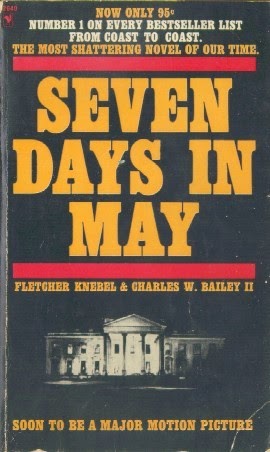As far as the
black-and-white movies go, Kirk Douglas is one of my favorite stars. Like many of the Hollywood icons of the
classic era, he embodied toughness, grit, humor, integrity, confidence – all
the good qualities we expected to find in leading men back then. Sure, he could be a bastard if the role
called for it, but every time I see him on the screen I am hooked.
I liked him in
Kubrick’s World War I moralistic epic Paths
of Glory. I liked him as Doc Holiday
in Gunfight at the OK Corral. Superb as Vincent Van Gogh in Lust for Life. He was great in the relatively unknown Ace in the Hole. And one on my favorite Kirk Douglas
performance was in Seven Days in May,
perhaps because of the “last boy scout” aspect to his Colonel Casey, perhaps
because of the visceral power struggle with his nemesis and superior commanding
officer, Burt Lancaster, himself no slouch on the big screen.
Seven Days in May deals with a secret coup d’etat against a
flailing President of the United States (played by Fredric March), launched by
the charismatic Air Force general (Lancaster) in charge of the Joint Chiefs of
Staff. A mid-level Colonel at the
Pentagon (Douglas) stumbles across a few odd occurrences one Sunday, such as
the heads of the Army, Air Force, Navy, and Marines sending in bets on the
Preakness horse race in May and the possible existence of a heretofore unknown
division of soldiers called ECOMCON (Emergency Communications Control) and a heretofore unknown military
base. Putting the pieces together in a
spooky and ominous way, Colonel Casey’s conscience forces him to bring his
uncertainties to the President. Through
some deduction and detective work, the coup is uncovered, set to take place
during a full-scale military exercise six days later. The question remains: how to stop this
exercise in brutal military muscle-flexing while remaining firmly on the side
of the Constitution and the American way of life.
Needless to say,
it’s a great political thriller with some great confrontational scenes between
March and Lancaster and Douglas and Lancaster.
One of the best closing exchanges ever in the history of movies, too.
I’ve seen it a
handful of times. Saw it with the wife
and she seemed to enjoy it too. Then I
found the novel John Frankenheimer based his movie one at one of my used book
stores a year or so ago, immediately bought it and finally got around to
reading it.
Which got me
thinking. Which was better – the book or
the movie?
The movie
generally follows the book in plot with a few major differences. In the book, the President has a few more
allies working with him; in the movie it’s just him, Casey, his chief of staff
and a senator friend. The book also
worked in more of Lancaster’s compatriots, whereas in the movie they are
faceless brass. If I recall correctly,
the movie presented March’s President, Lancaster’s General Scott, and Douglas’s
Colonel Casey as a triumvirate with more-or-less equal screen time. In the book it seemed that Casey had much
less time; his time as the focal point was given instead to the President. So in the movie if President/Casey/Scott was
at 40/40/20, in the book it’d be 60/20/20.
But that’s just an unscientific spur of the moment survey of
three-week-old memories echoing in my brain.
Anyway, the
major difference between the book and the movie is, as far as I can tell, Ava
Gardner. A character in the book who
inhabits exactly one chapter is written up for Ms. Gardner, and I can
understand why. And in the book, the
President is confronted with the option of using a tax return the Gardner
character has which has a deduction for “entertaining” General Scott, and it’s
implied this will publicly humiliate the General. In the movie it’s a stack of love letters
from a failed extramarital romance.
Maybe the first is a euphemism for the second, but either way it’s a
seedy, last-ditch fallback plan the distinguished President does not want to
use. Truth be told, in both media, it
was the weakest part for me.
The best
parts? The no-nonsense
confrontations. Between President and
potential Usurper. Between potential
Usurper and his unimpeachable underling.
Whether its March and Lancaster or Lancaster and Douglas verbally
sparring, those scenes are the payoff.
Right vs. Wrong, Right vs. Might, the Constitution – those who would
uphold it vs. those who would usurp it.
Great stuff, great dialogue. And
when it comes to the choice between reading those blistering, tension-laden
exchanges between characters on the page or icons on the silver screen, the
edge has to go with the movie every time.
And that classic
question at the end: Do you know who Judas was?
The answer is worth the price of admission.
Grade: Movie –
A+ / Book – A







No comments:
Post a Comment